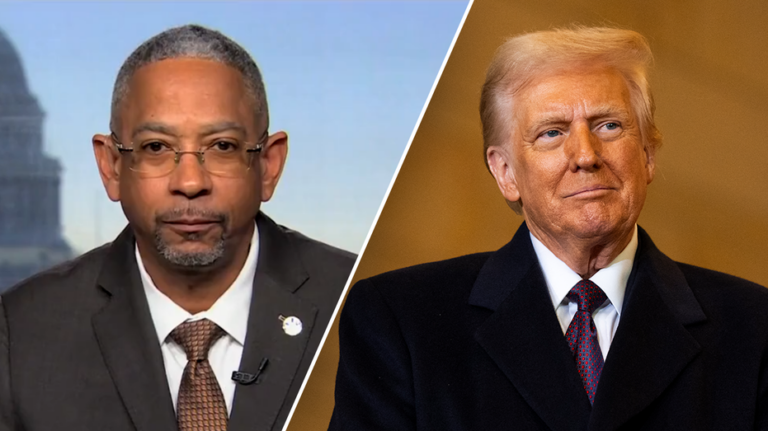
Fox News Decision Desk can report that Indiana voters chose Republican Mike Braun to be their next governor Tuesday, cementing the state’s solidly red status – even as his face-off against Jennifer McCormick had put some political observers on edge.
In the end, Braun, who currently serves in the U.S. Senate, beat Democratic candidate McCormick, a former Indiana superintendent of public education, and Libertarian candidate Donald Rainwater. Braun will replace outgoing two-term Gov. Eric Holcomb, also a Republican.
Braun, McCormick and Rainwater each espoused a wide range of views on reproductive rights, fighting inflation, and how best to support the growers, farmers and small business owners in the state.
But Braun had struggled to appeal to some moderate voters, and faced a tighter-than-expected race with McCormick, a Republican-turned-Democrat who ran heavily on issues of public education and expanding women’s reproductive rights.
“The GOP is still clearly favored there but there’s been enough activity that it doesn’t seem like an average, sleepy ‘Safe’-rated contest,” analysts at the University of Virginia’s Center for Politics wrote in a pre-election blog post.
FLURRY OF PRE-ELECTION LEGAL CASES IS NOW ‘STANDARDIZED’ STRATEGY, EXPERTS SAY
Despite their differences, all three candidates sought to appeal to voters on key issues: Among them, lowering property taxes, increasing support for small businesses, and creating new investments and economic opportunities in the state.
Braun focused his policy plans on so-called “kitchen table” issues in a bid to attract moderate voters, such as lowering health care costs, increasing public safety, and helping Indiana farmers and growers.
His campaign has released policy proposals designed to focus on lowering taxes for homeowners and small business owners in the Hoosier State, including a reduction on taxes for certain types of equipment used by farmers and other crop producers.
SMALL TOWNS BUCKLING UNDER BURDEN OF MIGRANT SURGE
On health care, Braun’s plan had included some provisions that Republicans previously attempted and failed to pass in recent legislative sessions, including reforming prior authorization and regulations on pharmacy benefit managers.
McCormick, the Democrat, campaigned heavily on access to abortion and education in the final months of the race. Her support for abortion rights was a stark departure from the near-ban on abortions that state lawmakers approved in 2023 – but did win her appeal among some younger, female voters.
If elected, she had pledged to appoint new Indiana Supreme Court justices that support women, immigrants, health care providers, and the LGBT+ community.
All three also detailed plans for addressing Indiana’s affordable housing crisis, which is among the worst in the Midwest and the subject of a two-year task force. Their plans, however, were also strikingly different. While Braun is planning to look into any “burdensome state regulations” that could be behind the spike in property taxes, he has also stressed the role of businesses in the state in helping revive the local economy.
McCormick, meanwhile, had called for a $600 million tax relief plan for property owners in the state.
Rainwater introduced a proposal that seeks to cap property taxes at just 1% of the purchase price – a drastic step that would have required amending the state’s constitution.
Fox News Decision Desk can report that Indiana voters chose Republican Mike Braun to be their next governor Tuesday, cementing the state’s solidly red status – even as his face-off against Jennifer McCormick had put some political observers on edge.
In the end, Braun, who currently serves in the U.S. Senate, beat Democratic candidate McCormick, a former Indiana superintendent of public education, and Libertarian candidate Donald Rainwater. Braun will replace outgoing two-term Gov. Eric Holcomb, also a Republican.
Braun, McCormick and Rainwater each espoused a wide range of views on reproductive rights, fighting inflation, and how best to support the growers, farmers and small business owners in the state.
But Braun had struggled to appeal to some moderate voters, and faced a tighter-than-expected race with McCormick, a Republican-turned-Democrat who ran heavily on issues of public education and expanding women’s reproductive rights.
“The GOP is still clearly favored there but there’s been enough activity that it doesn’t seem like an average, sleepy ‘Safe’-rated contest,” analysts at the University of Virginia’s Center for Politics wrote in a pre-election blog post.
FLURRY OF PRE-ELECTION LEGAL CASES IS NOW ‘STANDARDIZED’ STRATEGY, EXPERTS SAY
Despite their differences, all three candidates sought to appeal to voters on key issues: Among them, lowering property taxes, increasing support for small businesses, and creating new investments and economic opportunities in the state.
Braun focused his policy plans on so-called “kitchen table” issues in a bid to attract moderate voters, such as lowering health care costs, increasing public safety, and helping Indiana farmers and growers.
His campaign has released policy proposals designed to focus on lowering taxes for homeowners and small business owners in the Hoosier State, including a reduction on taxes for certain types of equipment used by farmers and other crop producers.
SMALL TOWNS BUCKLING UNDER BURDEN OF MIGRANT SURGE
On health care, Braun’s plan had included some provisions that Republicans previously attempted and failed to pass in recent legislative sessions, including reforming prior authorization and regulations on pharmacy benefit managers.
McCormick, the Democrat, campaigned heavily on access to abortion and education in the final months of the race. Her support for abortion rights was a stark departure from the near-ban on abortions that state lawmakers approved in 2023 – but did win her appeal among some younger, female voters.
If elected, she had pledged to appoint new Indiana Supreme Court justices that support women, immigrants, health care providers, and the LGBT+ community.
All three also detailed plans for addressing Indiana’s affordable housing crisis, which is among the worst in the Midwest and the subject of a two-year task force. Their plans, however, were also strikingly different. While Braun is planning to look into any “burdensome state regulations” that could be behind the spike in property taxes, he has also stressed the role of businesses in the state in helping revive the local economy.
McCormick, meanwhile, had called for a $600 million tax relief plan for property owners in the state.
Rainwater introduced a proposal that seeks to cap property taxes at just 1% of the purchase price – a drastic step that would have required amending the state’s constitution.





